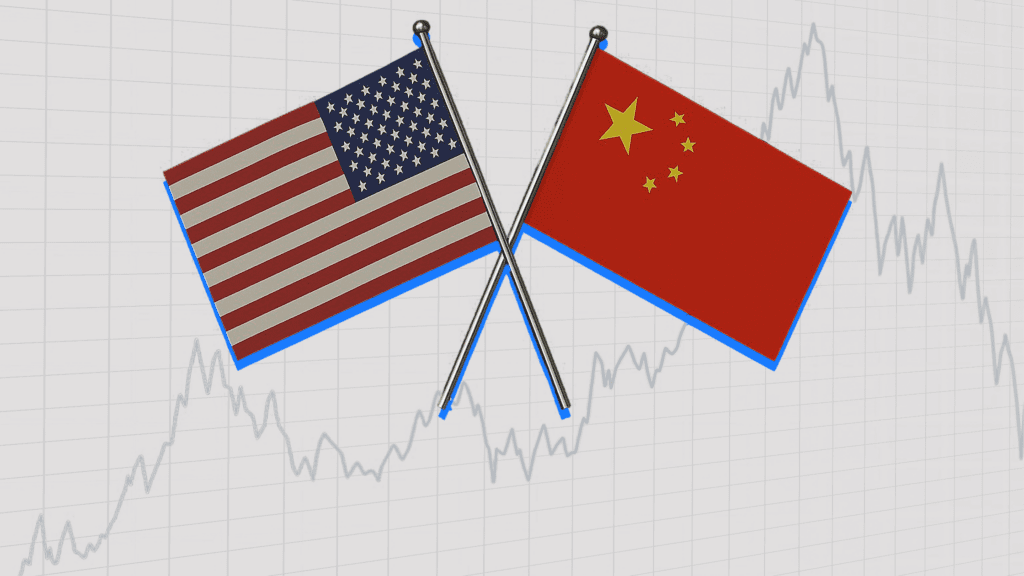Trade tensions between global powers are nothing new, or even surprising, but 2025 has taken things to a whole new level. The recent tariff war between the U.S. and China has been dominating daily global headlines, and it’s making investors nervous
But what’s really going on? And, what does it mean for your investments?
What Sparked This 2025 Trade War?
It all started in March 2025, when the U.S. dropped a bombshell: tariffs as high as 125% on a wide range of Chinese imports. That includes electric vehicles (EVs), steel, and key tech parts. The goal? To boost American industries and address long-standing concerns about intellectual property theft and trade imbalances.
However, China didn’t stay quiet for long. It fired back with tariffs of up to 84% on American goods, especially targeting agriculture, cars, and most recently, luxury goods. That’s right, China retaliated by promoting direct sales of luxury goods from Chinese manufacturers. The result: a full-blown trade standoff that has global markets on edge.
The U.S. Point of View
According to U.S. policymakers, these tariffs are about:
- Protecting American jobs
- Fixing unfair trade practices
- And leveling the playing field
Supporters say it’s a step toward economic fairness. Critics, on the other hand, worry it might backfire, raising prices for consumers and hurting exporters.
China’s Response
China’s approach is to shield its own key industries while signaling it’s open to fairer trade. Officials have pointed to recent efforts to open markets and increase transparency, but also made it clear they won’t back down easily.
So… What’s the Bigger Picture?
This isn’t just a US–China tariff tug-of-war. It’s a glimpse into the larger shifts in global power and economic influence. And for investors, one word comes to mind: volatility.
What’s Happening in the Markets?
Let’s talk numbers (because they’ve been pretty wild).
- 📉 The S&P 500 fell nearly 10% between April 2–4
- 📈 Then jumped +9.5% in a single day after Trump reversed tariff policies on April 9
- 📉 The Nasdaq dropped over 11% that same week
- 📈 Then surged +12.2%, marking its biggest one-day gain since 2001
- 🪙 Bitcoin dropped below $75,000 amid recession fears
- 📈 Then bounced back above $82,000 – all in one week
- 💥 And most recently, on Sunday, April 13th, MANTRA’s $OM Token crashed 90% within hours, wiping out over $6 billion.
It’s been a rollercoaster, especially for investors holding nothing but stocks or crypto.
Real Estate: A Calmer Ride
When the stock market’s bouncing like a pinball machine, it’s no surprise many are looking for something a little more grounded.
That’s where real estate comes in.
Unlike stocks, it’s a physical asset, something you can see, touch, and rent out. It offers:
- Stable passive income from rent
- Protection from short-term market swings
- And long-term appreciation, especially in booming markets
Take Dubai, for example. In Q1 2025, prices continued to rise across popular areas like Jumeirah Village Circle, Business Bay, and Dubai Marina. Investor confidence is strong, and demand hasn’t slowed down.
The Smart Move? Diversify.
This isn’t about ditching your stocks or crypto altogether. But putting all your eggs in one basket, especially during global economic tension, can be risky.
Diversifying your portfolio is one of the best ways to manage that risk. That means including different types of assets, like real estate, which tend to behave differently from the stock market.
Final Thoughts
Trade wars may come and go, but a smart investment strategy lasts.
In turbulent and rather unpredictable times like these, diversification isn’t optional, it’s essential.
And with SmartCrowd, you don’t need millions to invest in Dubai’s real estate market. You can start with as little as AED 500, and own fractional shares in rental-generating properties.
✅ No stress
✅ No huge down payments
✅ Just smarter investing
So, let the stock market swing, while your real estate portfolio stays steady. Start building your future with SmartCrowd today and check out our latest real estate investment opportunities.
Disclaimer: This blog is intended solely for educational purposes and shouldn’t be treated as financial advice. We suggest you always conduct thorough research, perform your own due diligence, and consult with financial advisors to assess any real estate property against your own financial goals.






